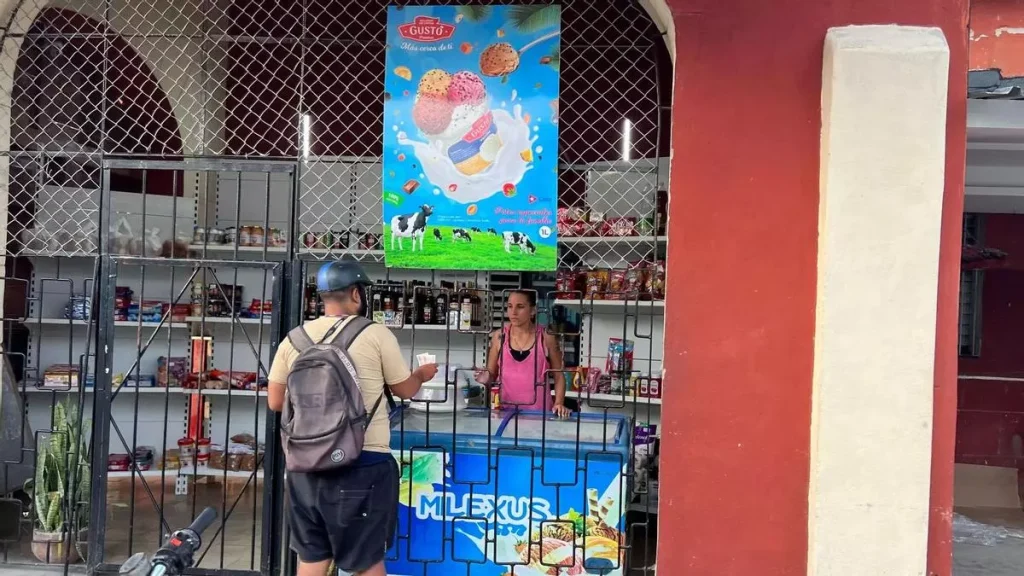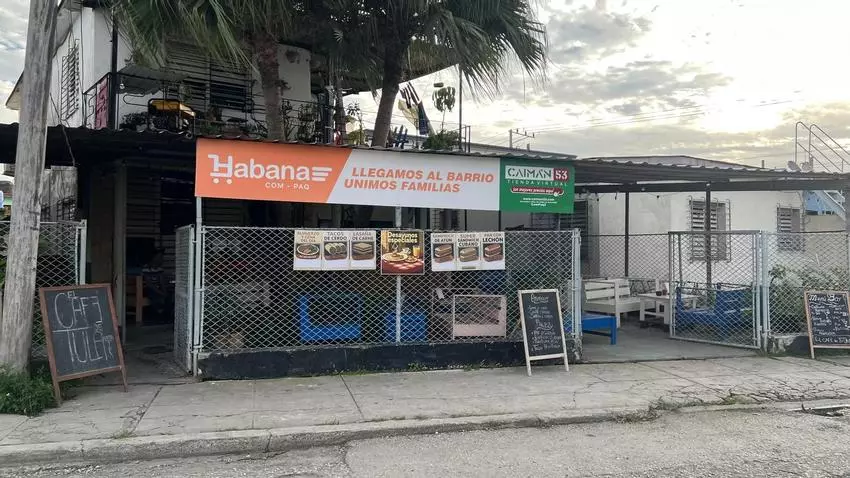Private businesses lost money by buying things from private wholesale companies when the currency rose from 450 pesos to 490 pesos, before falling to 410 pesos.

![]() 14ymedio, Darío Hernández, Havana, 6 November 2025 — The sudden fall of the dollar on the Cuban black market has put several private businesses and resellers in a tight spot, forcing them to readjust prices and purchasing strategies. Until a few days ago, the US currency was hovering around 500 pesos, but 6 November saw it at 410, a collapse that few had expected.
14ymedio, Darío Hernández, Havana, 6 November 2025 — The sudden fall of the dollar on the Cuban black market has put several private businesses and resellers in a tight spot, forcing them to readjust prices and purchasing strategies. Until a few days ago, the US currency was hovering around 500 pesos, but 6 November saw it at 410, a collapse that few had expected.
Alain, 37, owner of a small market in Guanabacoa, Havana, says that in recent days “people have been coming to sell dollars non-stop”. “I do sell in that currency, because that’s how I pay wholesalers who only accept foreign currency. This week I bought a sack of powdered milk and several bales of rice that way, no problem. They sell and buy in dollars, they don’t care,” he explains.
Everyone knows it’s illegal to sell in dollars, and things are not priced in that currency, but in pesos. In small businesses in Guanabacoa, most transactions are made in CUP (Cuban pesos), but many customers also use the small businesses as Cadeca (exchange bureaux) for small amounts, usually 10-dollar bills.
The currency’s rapid fall has left small businesses in a very difficult position: “The speed of the fall is alarming and unusual. There is no business right now,” explains Alain.

Yudith, who works for a foreign company, usually uses part of her salary in dollars to buy food in her neighbourhood. But this week, she says, it has been almost impossible to spend those dollar bills. “When the dollar drops a little, the buyers wait a few days for it to stabilise. But it’s been falling for a week and no one wants to buy them. If they accept them, it’s 15 or 20 pesos below what El Toque* publishes,” she complains.
Alain says that WhatsApp groups for suppliers and traders are full of messages against the independent media outlet that publishes daily currency exchange rates. “An image appeared with red letters saying ‘No to El Toque’, with the message: ‘share this, or we’ll all go bankrupt’. That was shared every day while the dollar rose to 490 pesos,” he says.
The shopkeeper recalls the anguish of that time: “I couldn’t buy oil, hot dogs, pasta or detergent because wholesalers were selling to me above the price cap. How was I supposed to resell that?”

In a country where education has demonised market dynamics and the law of supply and demand for more than six decades, many people fall for the regime’s propaganda accusing El Toque of manipulating the exchange rate with its daily publications on the informal currency market. Several of those interviewed are calling for this type of information to stop being published, so that “the market can regulate itself and people can buy and sell without a reference point, so perhaps the dollar wouldn’t rise so much”.
Pedro, an independent trader with a shop near the traffic lights in Guanabacoa, is afraid he will lose thousands of pesos this week. “I buy on Mondays, just once. Everything I have, I bought when the dollar was at 450. I bought crates of beer at 200 pesos, and today the same suppliers have it at 180. Until I sell what I have, I can’t lower my prices. But customers don’t understand. It’s very difficult to run a business here. Every day something new happens and you have to run,” he complains.
To cut back his losses, Pedro decided to stop accepting payments in dollars, at least for now. “I don’t even want to see them this week,” he says with a sigh.
Meanwhile, MSMEs** operating as wholesalers continue to stick with the dollar. “The people who sell you products in boxes and containers only work with foreign currency,” says Alain. “It’s the self-employed workers and retail shops who are no longer accepting dollars, because it no longer makes any business sense for them to pay in dollars for things that wholesalers sell in local currency. The same, or worse, happens with transfers: many suppliers simply do not accept them, and you are left stuck with your money, and you don’t know what to do.”
Translator’s notes:
*El Toque is anindependent Cuban online news outlet, that publishes real market exchange rates
**Literally, “Micro, Small, Medium Enterprise.” The expectation is that it is also privately managed, but in Cuba this may include owners/managers who are connected to the government.
Translated by GH
____________
COLLABORATE WITH OUR WORK: The 14ymedio team is committed to practicing serious journalism that reflects Cuba’s reality in all its depth. Thank you for joining us on this long journey. We invite you to continue supporting us by becoming a member of 14ymedio now. Together we can continue transforming journalism in Cuba.
